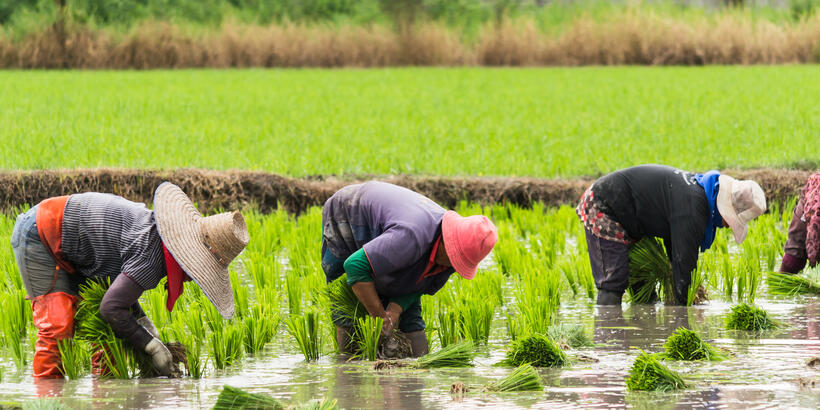Impacts of ENSO Events on Chinese Rice Production and the World Rice Market


Researchers
Climate shocks leading to floods and droughts present high levels of uncertainty and difficulties in decision making for water district managers, agricultural producers, and policymakers throughout the world. This project focuses on the impacts of El Nino-Southern Oscillation (ENSO) events on precipitation and temperature variability, and in turn on water management and crop production, in one of China's major rice bowls, Jiangxi Province. Jiangxi is also one of China's poorest provinces, where swings in crop production and prices can jeopardize rural incomes and food security.
The project involves four integrated components:
- the development of empirical downscaling models (EDMs) to quantify local climate patterns within Jiangxi province based on large-scale climate dynamics associated with ENSO;
- the construction of a hydrological model for Jiangxi to estimate the relationship between local precipitation, reservoir levels and storage, and water management decision practices;
- the use of regression models to analyze the effects of ENSO-induced climate variability on seasonal and annual rice production in Jiangxi; and
- the development of a modeling framework to analyze the impacts of ENSO events on rice trade and prices within China and within the Asian rice economy.
The development of an ENSO-trade model, which builds on earlier research funded by NSF on ENSO-rice relationships in Indonesia and the Philippines, provides an important intellectual contribution that will permit further analysis of ENSO impacts on agriculture and food security throughout Southeast and East Asia. It also has practical policy implications for governments seeking to stabilize commodity prices under unstable climatic conditions.
A key contribution of the project is the creation of a new collaborative team of Chinese and American researchers whose work will enhance interdisciplinary educational opportunities in their home institutions, scholarly exchange between countries, and policy relevant science within China. The research team includes atmospheric scientists, hydrologists, economists, remote sensing experts, and policy analysts. Undergraduate and graduate students from the U.S. and China will be brought into the study with funding from this grant and from existing academic funding sources within the home institutions. The project represents one of the inaugural activities for the Center for Global Forecasting within the Chinese Academy of Sciences, and it will lead to a set of policy briefs to the current Premiere of China (Wen Jiabao) and his rural policy team (headed by Chen Xiwen).
Beyond China, the methods and results of the research will be shared with the international science and policy communities through a set of organized public meetings within Southeast Asia, the publication of peer-reviewed papers in leading climate, hydrology, and policy journals, and public talks at professional society meetings and smaller meetings related to future climate impacts. The results will also be disseminated through consultations with aid agencies (e.g., Asia Development Bank, USAID, the World Bank), the Consultative Group on International Agricultural Research (CGIAR), the Asian Disaster Preparedness Center (Extreme Climate Events Program), and private foundations that invest in agricultural technologies and programs to enhance food security (e.g., the McKnight Foundation, the Rockefeller Foundation, the Gates Foundation).
